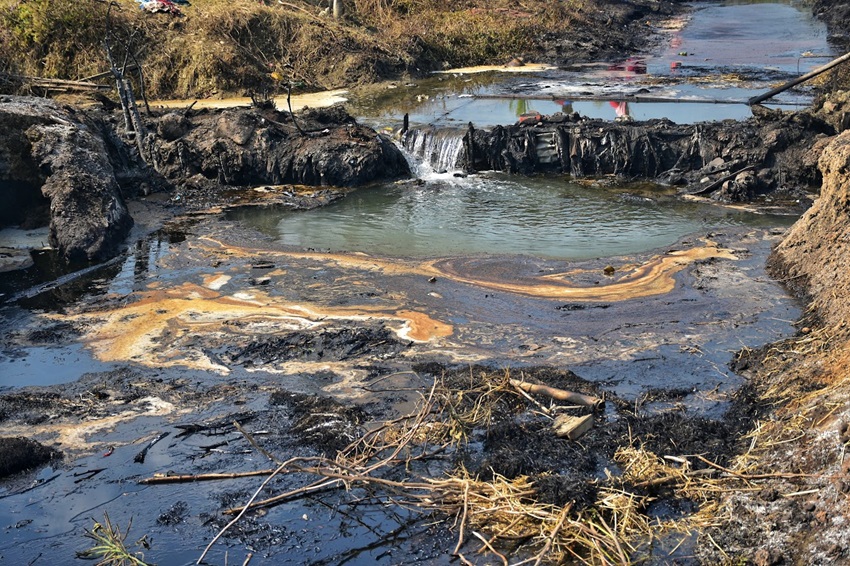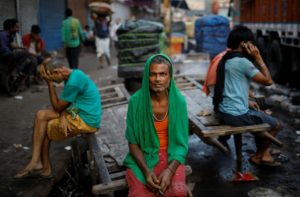Manipur Fuel Leak Raises Concerns Over Water Contamination

The site where officials set fire to burn the oil flowing with water. The state has constituted a three-member committee to explore its immediate and long-term effects (Photo by Robinson Wahengbam)
- Heavy fuel from a defunct power station flowed into streams on January 10 in Kangpokpi district in Manipur. The water is used by the local people for domestic and agricultural consumption.
- Following the water scarcity in the hamlet, the state resorted to ad hoc measures, sending water tankers to fill two of the only three existing small public tanks.
- The authorities are looking into the cause and effect and have created a committee to suggest immediate and long-term measures and security of the defunct plant.
The Manipur government constituted a three-member committee to inquire into the fuel leakage that was reported from the state’s Leimakhong power station in Kangpokpi district on January 10. The fuel spilled into streams passing through the villages of Kanto Sabal and Sekmai, where the locals are dependent on these streams for their livelihood. The streams eventually join the river Imphal downstream, a crucial water source for the region.
The streams of water with fuel caught fire, after which, the state issued a notice stating that the fuel had leaked from the defunct Leimakhong power station. The power station had been rendered non-operational a decade ago due to rising prices of heavy fuel oils and faulty engines that needed repairing regularly, thereby leading to heavy costs of operation.
The Manipur State Power Company Limited (MSPCL) reported theft and burglary in connection with the leakage. “The pipeline connecting the buffer tank to the main engine was cut off and hence the leakage occurred,” said Subhaschandra Singh, managing director, MSPCL. “The station has been defunct for a decade now so we are unable to determine the exact amount of oil being leaked. However, there must have been around 5-10 kilo litre (Kl) of oil in the buffer tank that got out.”
Immediate Intervention And The Aftermath Of The Spillage
The spillover would have reached Imphal river downstream and made its way into Loktak lake, if not for the “timely” interventions by the government and locals, who, together diverted the oil into paddy fields nearby, using an earthmover, said government officials and villagers.
“Around 6 pm, locals discovered a foul smell and noticed the oil floating in the water,” said Anita Lourembam, 46, a resident of Kanto Sabal. “Some people uploaded videos on social media and authorities rushed to the spot. The stream was diverted into the nearby paddy field and later, the thick coat of oil was burned before it entered the paddy field.”
Surchandra Laishram, 50, another resident of the village said that the burning was observed carefully by the fire brigade, as there was an active high-tension electric line running on top.” The spill was also burned a few more times with the fire brigade dousing the fire with foam, whenever the flames became huge and ran the possibility of burning the high-tension lines, suggesting that a major amount of the spill was burned.
“Our team secured the site by making a ‘containment boom’ (a floating barrier) and using shock absorbent materials,” said Ashok Paudel, chief engineer of Oil Spill Combat Team (OSCT), the organisation that the state roped in to clean up the oil spill. “We removed the oil from the water. Moreover, to remove oil patches that were stuck on vegetation inside the stream, a secondary low-pressure wash with freshwater was given. The property of heavy oil is simple, it floats on top of water. Hence, with the running water from the stream, we are also using locally available rice hay as a natural barricade to stop the oil from coming in contact with the soil.” Heavy Fuel Oils are residual tar-like substances concentrated with sulphur which are left behind after refining crude oil and are reported to be highly toxic when dissolved in water and exposed to sunlight.
A recent study conducted by the National Institute of Technology, Manipur, suggests minimal presence of effluents and oil contamination in the affected area, although it noted that further tests to identify the presence of toxicity and other related carbon compounds in the water are needed. The low presence of effluents and contamination may be because the major amount of the spill was burned away before the samples were taken. The Directorate of Environment and Climate Change confirmed that they are preparing a post-impact assessment. The three-member team was tasked to inquire into the cause and effect and suggest immediate and long-term measures and security of the defunct plant.
“Our team is conducting a post-impact assessment of the spill to study the short-term and long-term impact. The study will take at least six months,” commented Brajakumar Tourangbam, deputy director, Directorate of Environment and Climate Change, Manipur.
Local Concerns And The Larger Lessons
The stream was the only water source for the villagers of Kanto Sabal who used it for both agrarian and domestic activities. “First our water supply was cut off in May due to the ongoing ethnic conflict and now with the oil spill, the last resort for our 110 odd households has also been cut off,” said Lourembam. Since the villages are now experiencing water scarcity, the state administration has resorted to ad hoc measures to alleviate the problem, sending water tankers to fill two of the only three existing small public tanks, while a borewell is also being dug. The village is a “buffer zone in ongoing ethnic conflict and one of the tanks is located at the periphery and it is quite risky even to try to put water from there,” adds Laishram.
Meanwhile, Usham Sanatampak, a farmer from the neighbouring village of Khurkhul, whose three hectares of paddy field was used for diverting the spill, has submitted an application to the district commissioner asking for relief. “I understand that the government and the locals were compelled to act swiftly and divert the oil, but the government should also provide some sort of relief or compensation until I can use my field for agriculture,” he added.
Ram Wangkheirakpam, Imphal-based environmental activist points out, “The oil spill not only reveals the state’s lack of preparedness to intervene scientifically in such incidents from the beginning but also serves as a medium to underscore the precarious lives that rural Manipur faces due to water scarcity.”
(Published under Creative Commons from Mongabay-India. Read the original article here)





